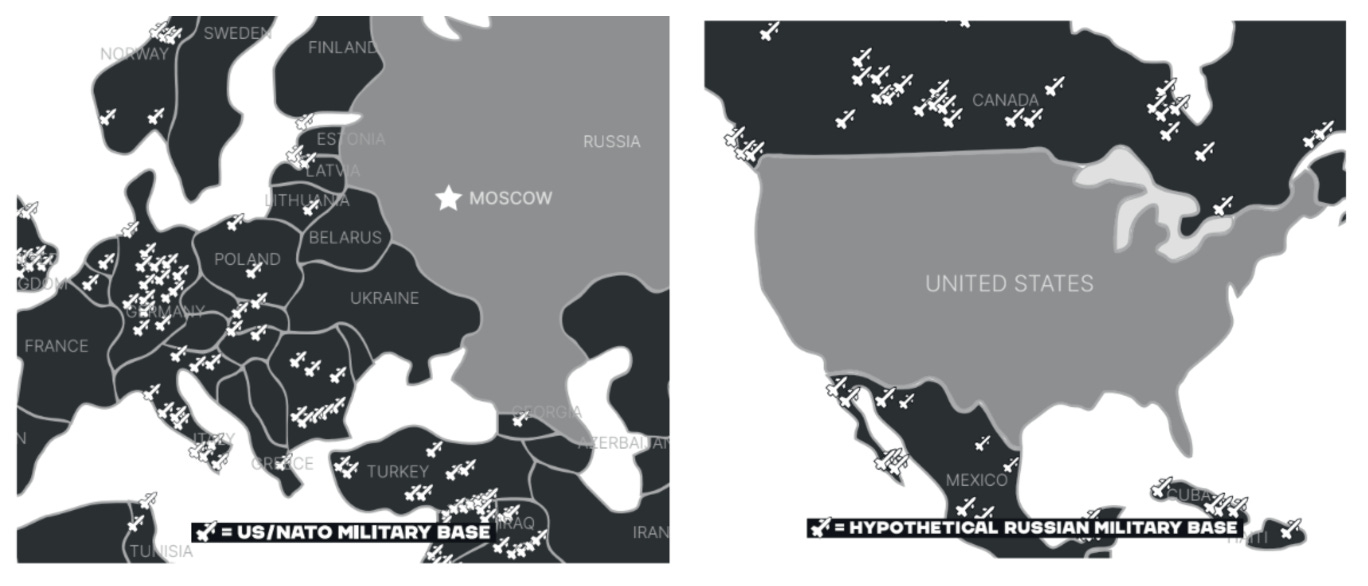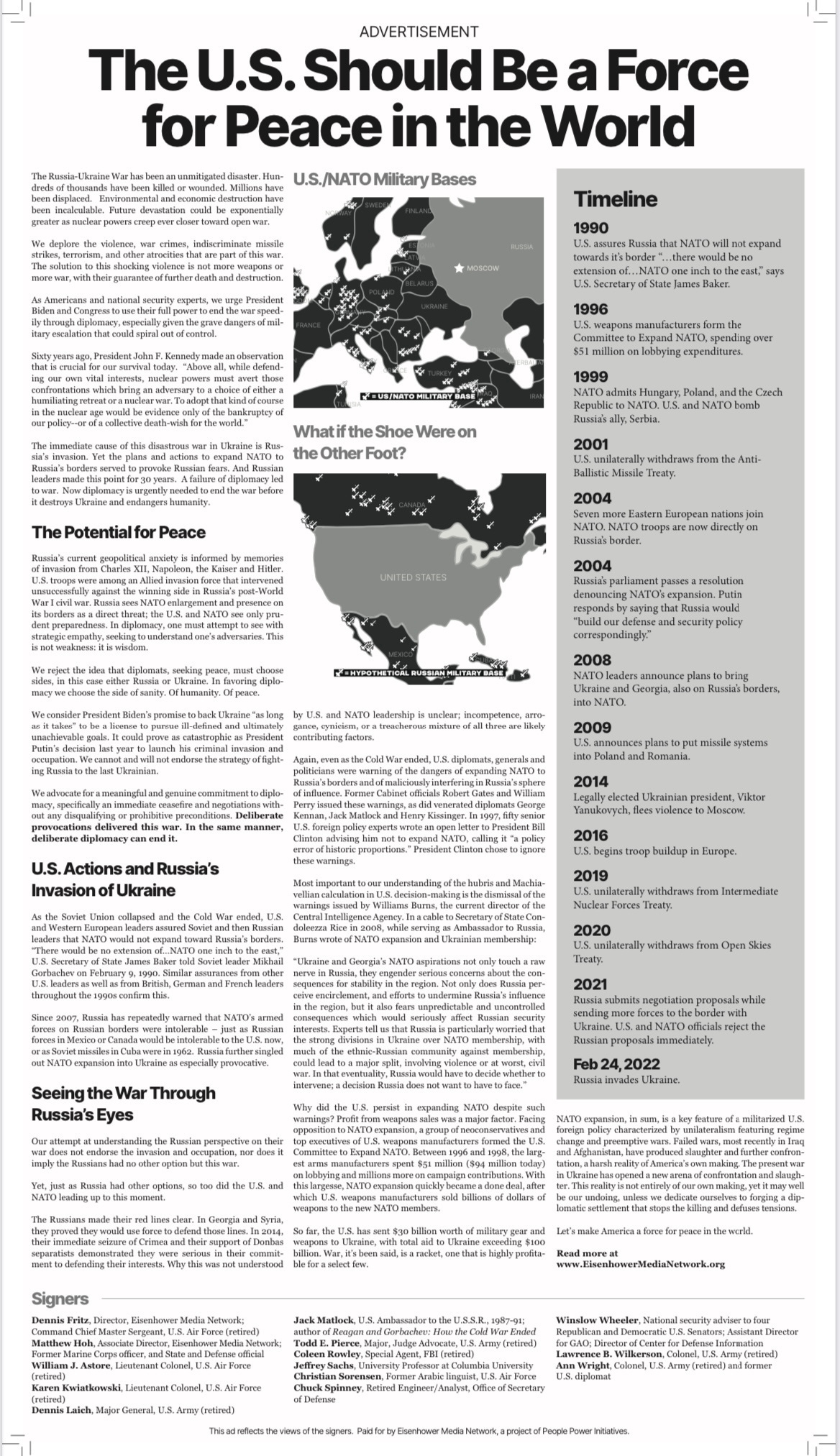“Omigod,” my wife said. “They’ve blown up Khmelnytskyi.”
Her family hail from the city’s outskirts. It’s a beautiful, bountiful patch of central Ukraine. We used to visit her grandparents’ farm. Now their village home is abandoned (assuming it’s even still standing).
Russian drones had struck “critical infrastructure” — it may or may not have been a Ukrainian / NATO ammunition depot — with explosions so terrifyingly huge, the authorities felt compelled to check afterwards for increased radioactivity. You can brush up on your Ukrainian swear words watching this compilation of videos of the explosions. (Spoiler alert: They’re mostly the same as the Russian swear words.)
So, here we are this Sunday afternoon, on day 452 of a totally avoidable, horrific and stupid war — a war initiated by Russia, but also a war provoked by the United States; welcomed by the United States; literally greenlit by the White House, as President Joe Biden in the months beforehand repeatedly rejected Russian diplomatic overtures seeking, one last time, for a non-NATO-based understanding of security in Europe; and then, once the Russians had indeed invaded, a war fueled by the United States to exponential new heights of violence and destruction.

The United States has tended this war like a garden; we’ve watered it with crocodile tears, and nourished it on ever-more-terrible weaponry, coaxing it to go grow larger and larger all of the time; and when the Russians and Ukrainians were both ready to quit and to talk peace, we shushed them, and sent them back to work on the war.
Wait — did you not know any of this?
Oh, did you actually think our multi-billion-dollar involvement was about helping others?
If you did think this — that’s kind of pathetic. You should probably feel some shame and indignation. That said, I can’t be too judgmental about it. As the saying goes, “Truth is the first casualty of war,” and it’s a rare voice these days that can be heard above our national security state’s long hysterical scream.
For example, most of us probably missed it when Stephen Kinzer, a former New York Times foreign correspondent with decades of reporting experience, registered a lonely, early objection. He spoke more than a year ago of the “two terrible afflictions” that had just been visited upon Ukraine. Affliction One was of course the Russian invasion. But Affliction Two, he asserted (correctly), was the American response — specifically, “[our] decision to send that suffering country massive amounts of advanced weaponry, which guarantees more suffering and death.”
“[U.S. weapons] will not only be used to kill Russians, but will also provoke Russia to respond by killing more Ukrainians … Those of us who have seen war up close know that it is the worst thing in the world. It destroys innocent lives and shatters families and communities forever, long after political and military conflicts end. … It’s about bodies blown apart and entire nations laid waste. The only winners are gleeful arms makers, for whom this war is a bonanza of bloodstained profit.”
Kinzer wrote that commentary for The Boston Globe; I suspect The New York Times, his old employer, wanted no part of his heresy. You can commonly find that sort of thing on Substack or Twitter, but only rarely does it slip past the goaltenders of our national media.
Which brings me to the full-page advertisement just published in the print New York Times — print only! — that calls on the United States to work to end the war as quickly as possible through diplomacy. Signatories include several high-ranking U.S. military officers, Ronald Reagan’s former U.S. ambassador to Moscow Jack Matlock, and the ubiquitous Columbia University economist Jeffrey Sachs.
I’ll paste the advertisement below, but three quick comments.
One, this is so overdue, and I’m grateful to those who organized it.
Two, it is so pathetic that this is the best we can do: A print ad in a physical newspaper that already doesn’t exist anymore outside of archives.
Three, it is such a relief to see a simple, straightforward suggestion: Let’s try diplomacy. No preconditions. No accusations. Just let’s get people around a table — preferably before a nuclear plant spent fuel pool catches fire, or worse.
An advertisement-for-peace. What a refreshing change! Up until now, I’ve been disillusioned with the so-called U.S. peace movement. Too many activists who know nothing about Ukraine, Russia or NATO nevertheless pompously insist on preconditions — before they want anyone talking to anyone else! It’s amazing. This is literally the Pentagon’s position; peace activists and the Pentagon are routinely on the same page today.
Hundreds of thousands of people have been killed in this war, and worse is likely to come, but in 2023 the average American peace activist says: “We cannot reward Russian aggression, so until my childishly ignorant ideas certain preconditions are fulfilled, it is my opinion that the fighting, dying and killing must go on.”
And so, this week’s lonely call for unconditional peace talks. As you read it, consider that The New York Times only grudgingly published this; they did it for money; and they put it in their print paper only, on the obvious assumption that it would never be seen again.




a brilliant, commanding critique of the current insanity--I want to talk to the author and publish his work--we have to come together against this war--there are more of us than we (probably) realize!
Right on. Keep doing what you do.